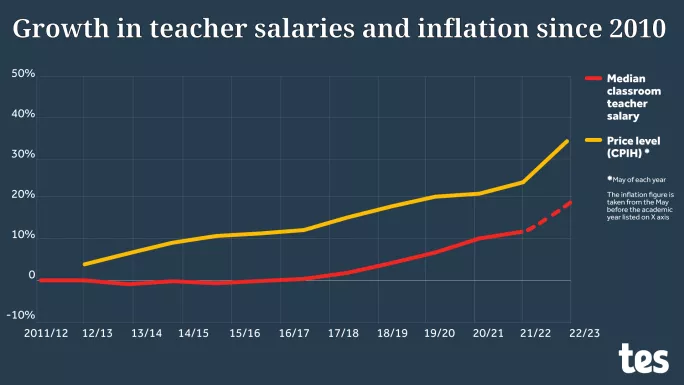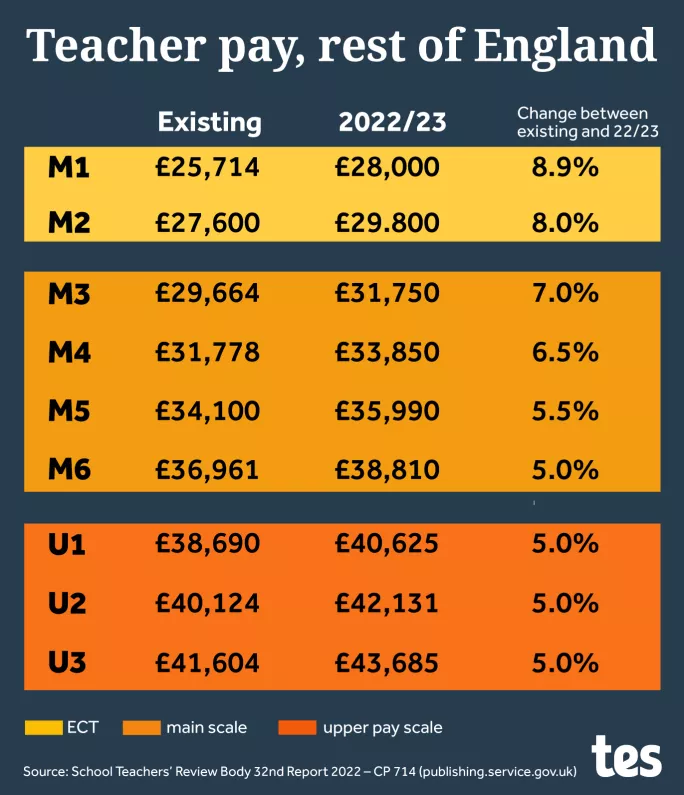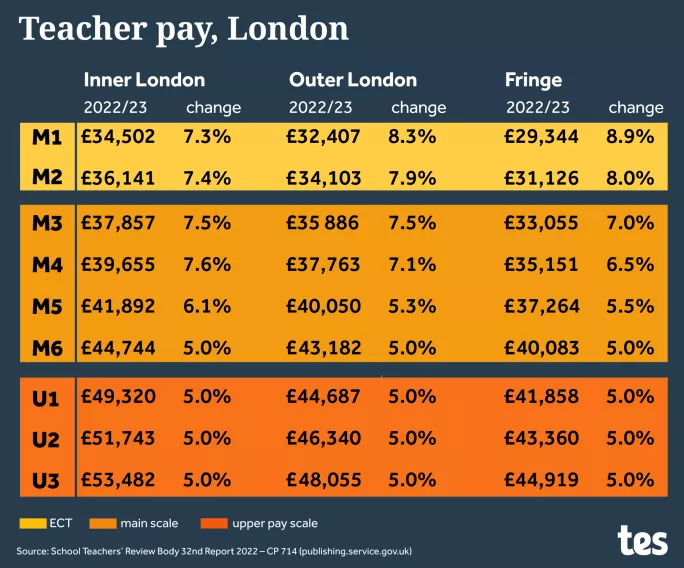Experienced teacher pay to rise by 5%

The Department for Education will award experienced teachers a 5 per cent pay rise from September 2022, it has announced today.
This is more than the DfE had originally proposed in March (3 per cent) but falls far short of the “fully funded, inflation-plus pay increase” demanded by teaching unions, with the current consumer prices index inflation rate at 9.1 per cent.

But the announcement has sparked an angry reaction from both teacher and headteacher unions, which have said they will consult members over industrial action.
Under today’s pay announcement, teacher starting salaries for outside London will rise by 8.9 per cent in September this year, reaching £28,000.
Experienced teachers and leaders, meanwhile, will receive 5 per cent.
The decision is in line with the recommendations from the School Teachers’ Review Body (STRB).


- Teacher pay: What the DfE’s plans mean for you
- Exclusive: Almost four in 10 teachers “would support strike” over 3 per cent pay rise
- Exclusive: School budgets on a “knife edge” over teacher pay
- Reaction: Heads contemplate industrial action over pay deal
- Cleverly: Not right time to confirm two year teacher pay deals
The DfE said the government had decided to confirm teachers’ salaries for the next academic year only, rather than the two years initially proposed, and return to the usual timeframe for the pay setting process for 2023-24.
Teacher pay: the threat of industrial action from teachers and heads
Both teaching and school leaders’ unions have strongly criticised the teacher pay award over concerns that it is not in line with the rising cost of living, and because of schools’ inability to meet the extra cost involved without funding.
Geoff Barton, general secretary of the Association of School and College Leaders, said: “This pay award is wholly inadequate and represents the worst of all worlds - a substantial real-terms pay cut for the majority of teachers, which will worsen teacher shortages, and no additional money for schools to afford the cost of the award.”
He added: “We, like other unions, will be consulting our members to see whether they wish to take industrial action in response to this decision.”
Kevin Courtney, joint general secretary of the NEU teaching union, said it would “look towards” consulting members in the autumn, calling the award “very poor”.
The DfE plan represents an increase on its previous proposal, which was submitted before the scale of the cost-of-living crisis became clear.
In March, Nadhim Zahawi, who was then education secretary, wrote to the STRB asking for a recommendation that the starting salary for teachers reaches £30,000 by 2023, saying a rise was needed to boost recruitment and retention.
To reach that starting salary, the DfE had recommended an 8.9 per cent uplift to the statutory minimum (M1) for qualified teachers outside of London in 2022-23, followed by a 7.1 per cent increase in 2023-24.
However, under those proposals, more experienced teachers on the upper pay ranges would have received a lower pay rise of 5 per cent over two years rather than one.
Education secretary James Cleverly said that teachers are ”the fabric of our school system” and that it is “their dedication and skill that ensures young people can leave school with the knowledge and opportunities they need to get on in life”.
Mr Cleverly added that the DfE was delivering “significant pay increases for all teachers, despite the present economic challenges”.
He said the pay rise for starting salaries “will attract even more top-quality talent to inspire children and young people and reward teachers for their hard work”.
Writing in Tes today Mr Cleverly said the announcement was “coming at a time when everyone is feeling the effects of some huge economic pressures”.
Mr Cleverly said that while the initial government proposals to the STRB had been for a 3 per cent pay rise in the 20220-23 academic year, the economic picture had since “changed beyond recognition”.
He said that because of these changes since March, the DfE would be accepting the STRB’s recommendation of a 5 per cent uplift in September.
Mr Cleverly said the pay award “recognises the incredible work of teachers and leaders over the past year”.
The STRB recommendations to the DfE have also been published today.
STRB says ‘material change needed’ on teacher pay
In its report, the STRB says it was “necessary and appropriate” to exceed the government’s proposed general pay increases for experienced teachers (of 3 per cent in 2022 and 2 per cent in 2023) in order to “address the risks to teacher supply while balancing the needs of affordability”.
Its analysis of real-terms pay changes over time suggests that the “competitiveness” of teachers’ earnings compared with the whole economy, and with professional occupations, “was lower in 2020-21 compared to 2010/11”.
And it adds that on a number of measures, teachers’ pay “continues to fall below that of comparators”, concluding that “material change is needed to address this situation”.
The report also says that the STRB had asked the DfE to submit evidence by 16 February of this year.
It adds: “The Department for Education subsequently informed us that it would be unable to meet this deadline so it was extended to 4 March for all consultees.
“Subsequently, this report is being submitted to the secretary of state and prime minister in June 2022.
“Any delay to the process is unfortunate and adds to the concerns of consultees about our reports increasingly being published at the end of the academic year, making timely implementation more challenging.”
Register with Tes and you can read two free articles every month plus you'll have access to our range of award-winning newsletters.
Keep reading with our special offer!
You’ve reached your limit of free articles this month.
- Unlimited access to all Tes magazine content
- Save your favourite articles and gift them to your colleagues
- Exclusive subscriber-only stories
- Over 200,000 archived articles
- Unlimited access to all Tes magazine content
- Save your favourite articles and gift them to your colleagues
- Exclusive subscriber-only stories
- Over 200,000 archived articles
topics in this article



